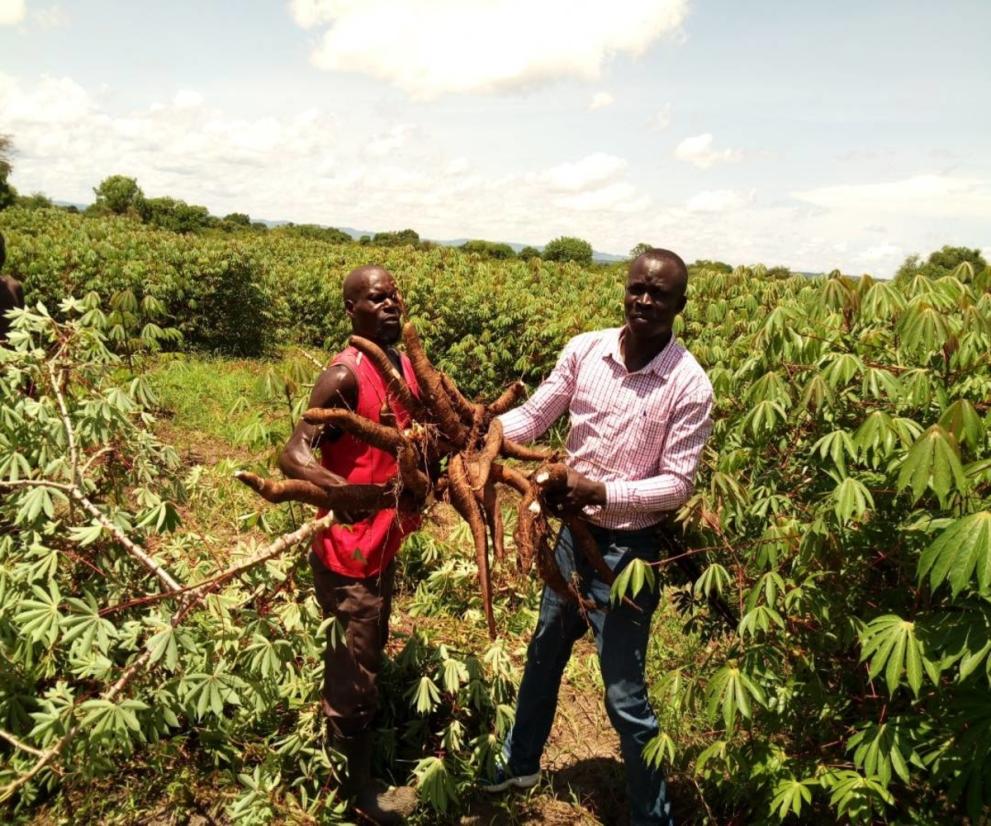
"Before I joined the Complementary Farmers’ Group and received training, I only produced food for subsistence purposes using traditional methods of digging. My harvest was low; just enough to feed my family without any surplus for sale", says 42-year-old Ronnie Ajobe, a farmer in Tulenge village, Rhino Camp refugee settlement, where he lives with his two wives and eight children.
Ronnie belongs to the Complementary Farmers’ Group; a group of seventeen South Sudanese refugees and eight Ugandans that not only farm but also set an example of how refugee and host community can build a better future together. The group was trained by the Community Empowerment for Rural Development (CEFORD) to improve its farming skills but also in group dynamics, to enable peaceful co-existence, in leadership and resource mobilisation skills and teamwork. More than half of the members are women.
In terms of agricultural training, the group participated in Participatory Agro Enterprise Development (PAED) training, under which they learned how to develop business plans and enterprises.
They agreed that the cassava production was a profitable business for the refugee settlement and therefore selected it as their investment venture. Cassava is a weather-resistant crop. Its tubers are a common food in West Nile and can be boiled or dried and ground to make cassava flour.
The Community Empowerment for Rural Development (CEFORD) program also supported selected farmers to participate in the production of cassava cuttings for seed multiplication. Ronnie was one of them.
“I received six bags of cassava stalk as part of the start-up input, which I planted on three acres of land,” he explains. After just nine months, Ronnie and his family were reaping twofold – the cassava roots are used for their own nutrition, while the stalks can be sold for re-planting. Ronnie currently supplies cassava stalks to farmers in other farming groups.
Through his business and marketing training, Ronnie now knows how, where, when and to whom to sell his produce. From his earnings, Ronnie has already bought a piece of land to farm. “Our plan as a family is to construct a permanent house in Kubala. We will also expand our cassava plantation,” he says.
Background:
Ronnie Ajobe is one of the many farmers supported by Community Empowerment for Rural Development (CEFORD), a non-governmental organisation based in West Nile implementing the Support Programme for Refugees and Host Communities in Northern Uganda (SPRS-NU), which is funded by the European Union Emergency Trust Fund (EUTF).
Through its livelihood programme, CEFORD works with groups comprising refugees and Ugandans (host communities), facilitating them to achieve home-based food security as well as income to enable them meet their other needs and save.
"Ultimately, we hope to achieve the SPRS-NU objective of improving the communities’ livelihoods through better food and nutrition security in the settlement and host community as well as a stronger business environment and improved commercial flow between the communities" says Godwin Amege, CEFORD Project Coordinator.
Details
- Publication date
- 8 August 2018
- Region and Country
- Uganda
- Thematic
- Greater economic and employment opportunities
